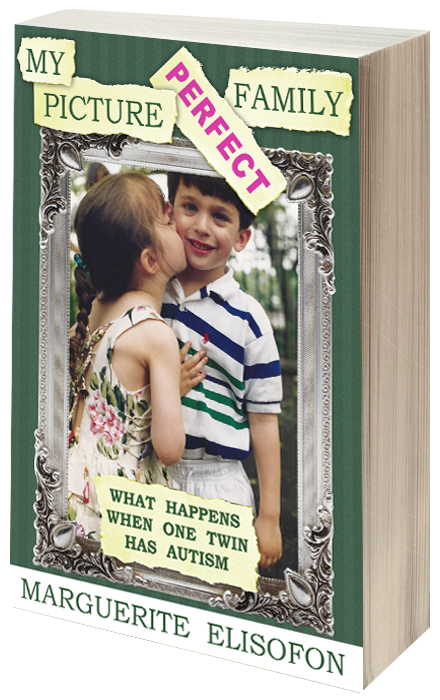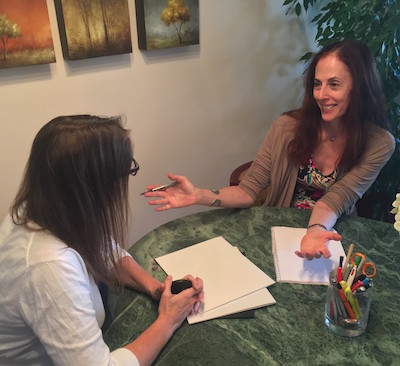 Although my daughter on the autistic spectrum is 25, she has never voted in an election. Hopefully, the 2016 presidential election will be the first of many elections where Samantha will make her voice heard. Like many other parents of young adults on the spectrum, I have spent long years teaching Samantha millions of everyday activities so that she could live as independently as possible. Somehow politics and voting never made it onto my list of essentials—until now. Given the choice of voting for a hateful Republican candidate who denigrates women, minorities and people with disabilities, or Hillary Clinton—who actually has proposed programs to support adults with autism—how can Samantha NOT vote? See
Although my daughter on the autistic spectrum is 25, she has never voted in an election. Hopefully, the 2016 presidential election will be the first of many elections where Samantha will make her voice heard. Like many other parents of young adults on the spectrum, I have spent long years teaching Samantha millions of everyday activities so that she could live as independently as possible. Somehow politics and voting never made it onto my list of essentials—until now. Given the choice of voting for a hateful Republican candidate who denigrates women, minorities and people with disabilities, or Hillary Clinton—who actually has proposed programs to support adults with autism—how can Samantha NOT vote? See  https://www.hillaryclinton.com/briefing/factsheets/2016/01/05/hillary-clintons-plan-to-support-children-youth-and-adults-living-with-autism-and-their-families/ My daughter’s future is at stake, and it’s my job as a parent to help her understand how to make the best and most informed choices.
https://www.hillaryclinton.com/briefing/factsheets/2016/01/05/hillary-clintons-plan-to-support-children-youth-and-adults-living-with-autism-and-their-families/ My daughter’s future is at stake, and it’s my job as a parent to help her understand how to make the best and most informed choices.
No, I’m not going to explain the whole Constitution or delve into the three branches of government and their separation of powers. During past elections, I’ve already tried explaining the differences between Republicans and Democrats in the most basic terms, but Samantha’s eyes had glazed over. Nevertheless, she is able to dutifully repeat back to me that Republicans want less government, lower taxes, and stand against abortion while Democrats believe in more government, higher taxes and support a woman’s right to choose. However, even these simplified differences between our political parties held no real meaning for Samantha. Abstract concepts are extremely difficult for my daughter to master, and she’s not motivated to persevere through the hard work necessary to understand UNLESS she knows that the abstract idea will connect with her own concrete experience in a meaningful way. When it comes to voting in an election, the moment when Samantha needs to understand is now, fall of 2016. In the upcoming election, there will be no gray areas for people with disabilities like my daughter; her choices are black and white.
 After more than a year of unsuccessfully trying to secure a competent, government approved life skills (“community habilitation”) worker for Samantha, I have reluctantly (and temporarily, I hope) taken on this job myself. Today’s life skills lesson included helping Samantha register to vote—thankfully registering is a simple computer exercise. But the tricky part was explaining WHY? WHY register? WHY bother straining to understand the pros and cons of presidential candidates? WHY is the outcome of this particular election important, and how will it impact Samantha?
After more than a year of unsuccessfully trying to secure a competent, government approved life skills (“community habilitation”) worker for Samantha, I have reluctantly (and temporarily, I hope) taken on this job myself. Today’s life skills lesson included helping Samantha register to vote—thankfully registering is a simple computer exercise. But the tricky part was explaining WHY? WHY register? WHY bother straining to understand the pros and cons of presidential candidates? WHY is the outcome of this particular election important, and how will it impact Samantha?
Right now the answer to those questions is simple. For Samantha and others with disabilities, registering as Democrats is self-advocacy, and voting for Hillary Clinton is the only way to go. My daughter and her peers need help becoming independent, finding meaningful work and safe-but-dignified housing options. Living at home with her parents two years out of college—with no job and no prospect of finding a job—has turned an abstract concept (the importance of training and employing people with disabilities) into a concrete reality that my daughter grasps completely and fervently yearns to change. Now, like never before, Samantha knows that she needs society’s support to fulfill her potential as an adult. Democrats like Hillary Clinton will at least TRY to support Samantha’s needs and promote her inclusion in the world. Republicans—especially Donald Trump—would cut existing programs and funding for the disabled, either ignoring or excluding this vulnerable minority.
Here’s my simple translation of the current political situation for Samantha and other ASD adults:
Democrats like Hillary Clinton want to help you. They care about you and others with disabilities. Hillary Clinton has proposed programs to help you make the transition from school to work.
Republicans like Donald Trump don’t want to spend the money to help you. They don’t care enough about you and others with disabilities. They will not work to include you in the neurotypical adult world. Helping people with disabilities costs money, and they want to save money.
 Donald Trump is an especially crazy, selfish and ruthless Republican. (Many Republicans agree). Remember the kids who bullied you growing up, the ones who called you names like “stupid,” “retarded” and ‘”loser?” Donald Trump is one of those bullies. If you’re a woman who happens to be overweight, he might call you “Miss Piggy,” “pig,” “slob” or “dog.” My daughter and other adults with disabilities have grown up with a bone-deep understanding of bullies. What they may not yet realize is that some bullies (like Trump) never grow up. Some bullies remain self-centered and heartless, even as they acquire wealth and power. People with disabilities need to pay attention because a big bully is trying to come into power now. Powerful bullies can most definitely hurt people. But if you see a bully who’s running for president, you can certainly cast your vote against him, exercising your own power to push back.
Donald Trump is an especially crazy, selfish and ruthless Republican. (Many Republicans agree). Remember the kids who bullied you growing up, the ones who called you names like “stupid,” “retarded” and ‘”loser?” Donald Trump is one of those bullies. If you’re a woman who happens to be overweight, he might call you “Miss Piggy,” “pig,” “slob” or “dog.” My daughter and other adults with disabilities have grown up with a bone-deep understanding of bullies. What they may not yet realize is that some bullies (like Trump) never grow up. Some bullies remain self-centered and heartless, even as they acquire wealth and power. People with disabilities need to pay attention because a big bully is trying to come into power now. Powerful bullies can most definitely hurt people. But if you see a bully who’s running for president, you can certainly cast your vote against him, exercising your own power to push back.
Young adults on the spectrum can learn many important life lessons by participating in this election. First and foremost, voting is an opportunity to exercise and express independence as an adult. Voting is a valuable opportunity for those who are often marginalized to make their voices heard. Further, participation in the political process can help people with communication issues feel included in important conversations. Even a simple political discussion is an opportunity for Samantha to become passionate and enthusiastic without being rude or offensive. As she learns to think about what’s best for her and the world, she is asking more questions and becoming a more active listener. Her vocabulary is increasing, and maybe she will begin to better distinguish truth from lies. I’d like to see the day when my daughter evolves to the point of realizing that people who disagree with us are not necessarily wrong, but may simply hold a different perspective.
 Am I sounding overambitious and too optimistic? Maybe, but I’d like to think that—at the very least—Samantha will realize that sometimes the best and only solution in extreme arguments is to agree to disagree.
Am I sounding overambitious and too optimistic? Maybe, but I’d like to think that—at the very least—Samantha will realize that sometimes the best and only solution in extreme arguments is to agree to disagree.





 Marguerite Elisofon is a New York City writer and the author of My Picture Perfect Family, a memoir about how her family navigated life with a child on the autistic spectrum before the internet and support groups existed. She also blogs about parenting young adults and disability related issues in The Never Empty Nest. Her writing has been featured in a variety of publications, including Time and NY Metro Parents magazine, and her family’s story has been featured by the NY Post, Fox News, The Daily Mail, and on Jenny McCarthy’s Dirty Sexy Funny radio show. A Vassar graduate, Marguerite was born and raised in New York City, where she still lives with her husband, Howard, in their mostly-empty nest. She is available to speak about a wide variety of issues relating to twins, parenting, and autism.
Marguerite Elisofon is a New York City writer and the author of My Picture Perfect Family, a memoir about how her family navigated life with a child on the autistic spectrum before the internet and support groups existed. She also blogs about parenting young adults and disability related issues in The Never Empty Nest. Her writing has been featured in a variety of publications, including Time and NY Metro Parents magazine, and her family’s story has been featured by the NY Post, Fox News, The Daily Mail, and on Jenny McCarthy’s Dirty Sexy Funny radio show. A Vassar graduate, Marguerite was born and raised in New York City, where she still lives with her husband, Howard, in their mostly-empty nest. She is available to speak about a wide variety of issues relating to twins, parenting, and autism. 